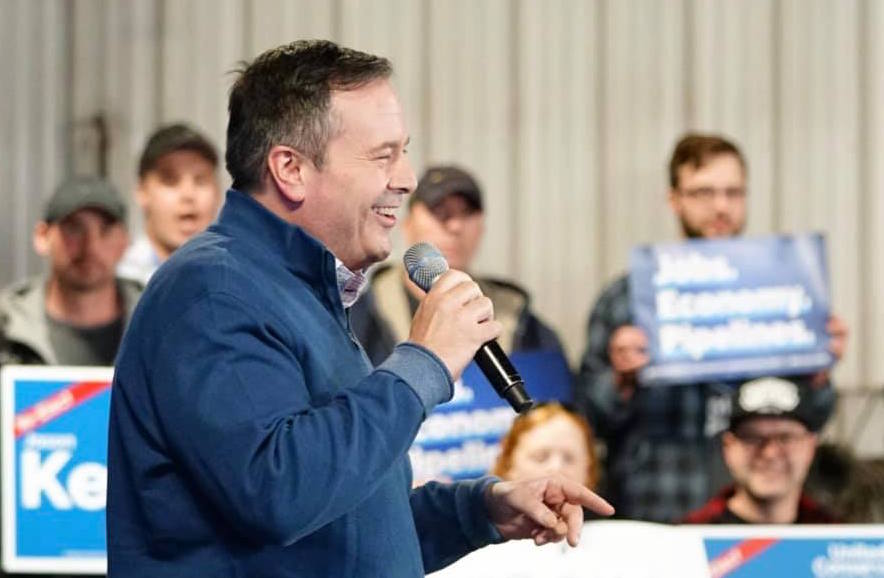The centrepiece of the United Conservative Party (UCP) of Alberta election program is a “job-creating” tax cut for business.
The provincial business tax rate will be reduced from 12 per cent to eight per cent over four years, promises UCP leader Jason Kenney, if the party wins the April 16 election.
The NDP government of Rachel Notley raised the business tax rate from 10 per cent to 12 after it was elected in 2015; and reduced the small business rate from three per cent to two.
Business tax rates across Canadian provinces are set at a similar level; currently the lowest provincial rate is 11.5 per cent.
Kenney expects Albertans to believe cutting business taxes creates jobs and wants them to ignore other consequences of the action.
It is true that cutting business taxes puts more money in the hands of corporations … to do as they please. The most obvious use of the money is to pay down corporate debt, which is what research shows often happens when corporate tax rates are reduced.
Corporations can hold on to their new money as retained earnings, which allows them to borrow less, or they can distribute the windfall to shareholders as dividends.
Publicly traded companies can use free cash to buy back their own stock: this technique been a main source of stock price increases.
In 2000 the Chrétien Liberals reduced federal corporate tax rates from 27 per cent to 21 per cent. In 2008 the Harper Conservatives reduced the same corporate tax rates from 21 per cent to 15 per cent.
The significant impact of the corporate tax reductions was to increase the cash reserves of Canadian corporations from $187 billion in 2001 to $575 billion in 2011. This prompted Bank of Canada Governor Mark Carney to tell Canadian business to quit sitting on their “dead” money and make some productive investments.
Corporations make new investments and create new jobs — when they expect to make profits — not because they receive a four-percentage-point reduction in taxes payable, spread over four years.
No one is going to put money into major projects such as oil sands production or pipelines because they receive a one per-cent-per-year reduction in income taxes payable, despite what Kenney and the UCP say.
The main beneficiary of a corporate tax-rate reduction would be the corporations themselves.
Corporate money has long funded Conservatives in Alberta and Conservatives in return have provided business with low tax rates.
The Alberta NDP did eliminate corporate and union contributions to political parties, but as an analysis by journalist Max Fawcett shows, the door was left open for corporate contributions to third parties such as those common in the U.S.: political action committees or PACs.
Kenney created a United Alberta PAC that raised over $500,000 in the nine months running up to the start of the PC leadership campaign. Overall he used the high $4,000 limit on individual donations to raise $1.5 million to win the PC leadership before it merged with the Wildrose Party to form the new UCP.
Kenney has refused to release a full list of donors to his campaign. But his job-creation tax-cut approach to politics is designed to build financial support from business and the names that were revealed featured major business players.
After he won the PC leadership, Kenney had to win a leadership contest that included popular Wildrose leader Brian Jean.
As reported by CBC News, that contest is now under RCMP investigation for irregularities identified in the campaign. These included funding received from unidentified sources for a “kamikaze” candidate, Jeff Callaway, brought into the campaign to undermine Jean and help Kenney win.
Unsurprisingly, Callaway attacked Jean for saying that business tax cuts would have to wait for a better fiscal outlook.
In his book, Hoax Springs Eternal, psychologist Peter Hancock explains that hoaxes work when a significant group finds them appealing, cares about what is promised, and decides to champion them, creating interest in the scam.
Alberta big business backs the UCP-Kenney hoax that tax cuts create jobs. Corporations find the idea appealing. The approach was used successfully by Ronald Reagan in his 1980 run for the Republican nomination and then the U.S. presidency. It was called voodoo economics by his Republican opponent, George Bush Sr.
It has been used successfully ever since in Canada, as well as the U.S. Donald Trump made his first legislative move a tax cut.
The fact that tax cuts do not create jobs as predicted has not stopped right-wing parties in search of business support from repeating the promise.
Political parties are known to spread falsehoods or manipulate information in pursuit of power. It is done because pulling the wool over the eyes of the electors works. Jason Kenney expects it will work for him.
Duncan Cameron is president emeritus of rabble.ca and writes a weekly column on politics and current affairs.
Photo: Jason Kenney/Facebook
Help make rabble sustainable. Please consider supporting our work with a monthly donation. Support rabble.ca today for as little as $1 per month!





